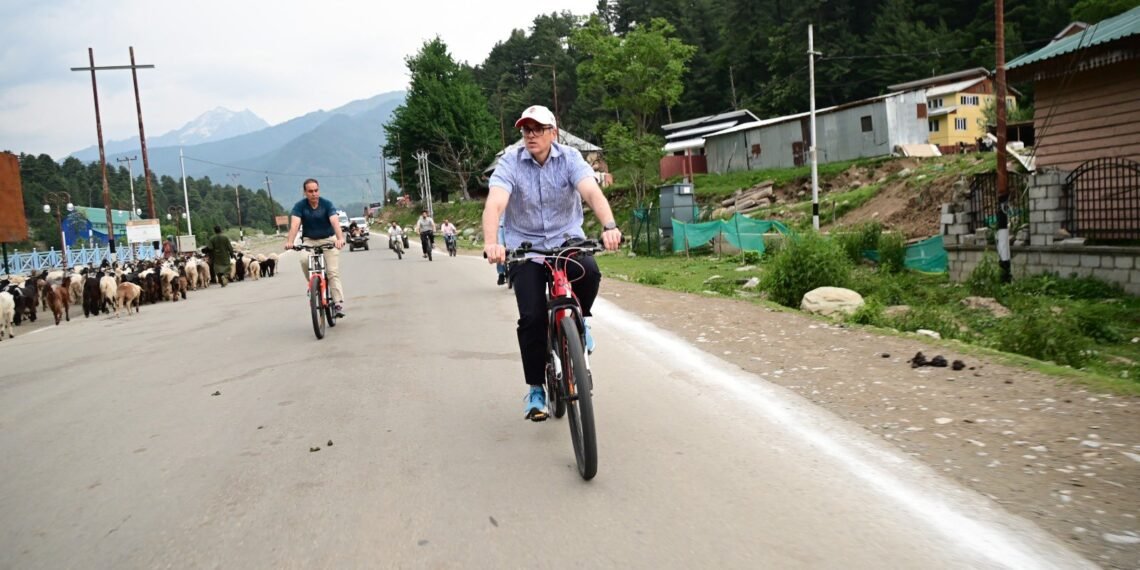By Pravin Kumar
The Omar Abdullah-led alliance government in Jammu and Kashmir is bracing for its first major political challenge as it prepares to tackle the highly contentious reservation policy.
The Cabinet Sub-Committee (CSC) report on reservations, a key issue in the National Conference’s (NC) election manifesto, is set to be tabled during a crucial cabinet meeting today at 6 PM at the Civil Secretariat in Srinagar.
Chief Minister Omar Abdullah will chair the meeting, which is expected to shape the government’s approach to balancing competing demands while addressing growing unrest among general category students.
The cabinet, comprising five ministers besides the Chief Minister, includes three CSC members: Health and Medical Education, Education, and Social Welfare Minister Sakina Itoo; PHE, Irrigation & Flood Control and Forest Minister Javed Rana; and Minister for Food, Civil Supplies & Consumer Affairs and Transport Satish Sharma.
While the agenda covers issues from five departments, official sources confirm that the CSC’s report on reservations will take center stage.
The current policy reserves 70 percent of government jobs and educational institution seats for various categories, leaving less than 30 percent for the general category, fueling widespread discontent among students and youth.
“The Cabinet Sub-Committee report will be tabled before the cabinet meeting,” a senior official said, speaking on condition of anonymity. The CSC, formed on December 10, 2024, following pressure from NC’s Srinagar MP Aga Ruhullah Mehdi, who championed the cause of students and youth, finalized its report on June 10, 2025, after six months of stakeholder consultations.
The panel’s recommendations are expected to propose a balanced approach to the reservation policy; however, the government faces a delicate task in deciding whether to implement them and how, especially since the legislature is not in session. The next Assembly session is slated for September or October.
“The cabinet will discuss these issues and finalize a roadmap on the reservation policy,” the official added. Sources indicate that the government is under significant pressure to address the concerns of general category candidates, who have expressed frustration over limited opportunities. However, any move to reduce reservations for any category is likely to be fraught with challenges. “A cut in the reservation for any category will be a difficult task, but without it, there is no way to provide relief to general category candidates,” a source noted.
Reservation Breakdown in J&K
The current reservation policy in Jammu and Kashmir allocates 70 percent of seats and jobs as follows:
Scheduled Tribes (STs): 20 percent (10 percent each for Gujjars and Bakerwals, and Pahari Ethnic Tribes)
Resident of Backward Areas (RBA): 10 percent (reduced from 20 percent amid allegations that influential individuals manipulated village inclusions for benefits)
Economically Weaker Sections (EWS): 10 percent
Other Backward Classes (OBCs): 8 percent (introduced a year ago by the BJP-led Central Government, replacing the earlier 4 percent for Other Social Castes)
Scheduled Castes (SCs): 8 percent
Residents of areas adjoining Line of Actual Control (ALC)/International Border (IB): 4 percent
Horizontal reservations: 10 percent (6 percent for Ex-Servicemen, 4 percent for Persons with Disabilities)
Additionally, candidates from reserved categories who qualify in the general category can opt for open category seats or jobs, further reducing opportunities for general category candidates.
Political and Social Context
The reservation policy has long been a flashpoint in Jammu and Kashmir, with competing demands from reserved and general categories. The NC-led government, which promised to address the issue in its election manifesto, is under intense scrutiny. The formation of the CSC came in response to vocal advocacy by MP Aga Ruhullah Mehdi, who has consistently supported the cause of students and youth seeking equitable opportunities.
The introduction of an 8 percent reservation for OBCs by the Central Government last year marked a significant shift, fulfilling a long-standing demand. However, the reduction of the RBA quota from 20 percent to 10 percent sparked allegations of past misuse, with claims that influential figures secured RBA benefits for their kin by manipulating village categorizations.
A Tightrope for the Government
The Omar Abdullah-led government faces a delicate balancing act. Any decision to alter the reservation structure risks alienating either reserved category groups or the general category, which has been vocal about its shrinking share of opportunities. The CSC’s recommendations, while expected to propose a compromise, will require careful navigation to maintain stability in the region. With the Assembly not in session, the cabinet’s decision today will likely set the tone for further deliberations when the legislature reconvenes.
The outcome of the cabinet’s deliberations will be closely watched by all stakeholders, with potential implications for the government’s credibility and the region’s social harmony.














